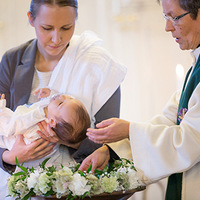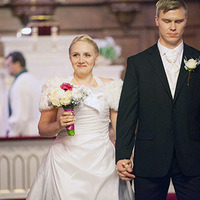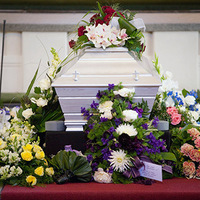Evästeet
EvästeetLinkki avautuu uudessa välilehdessä
The church conveys God's blessing on its members from cradle to grave. The water of life in baptism, the common creed of the confirmation service, marriage in the sight of God, the cross on the coffin – all these sustain hope in life as in death. Man is born blessed and the blessing sustains us when we depart this life.
 In holy baptism a person is received into the universal Christian Church and the local congregation. The Lutheran Church practises infant baptism. A child joins God's family as God calls the child by name to be his own. Those wishing to join the Christian Church as adolescents (e.g. during confirmation camp) or adults are also baptized. Baptism is one of the two sacraments (the most sacred rites) of the Lutheran Church alongside the Lord's Supper (Holy Communion).
In holy baptism a person is received into the universal Christian Church and the local congregation. The Lutheran Church practises infant baptism. A child joins God's family as God calls the child by name to be his own. Those wishing to join the Christian Church as adolescents (e.g. during confirmation camp) or adults are also baptized. Baptism is one of the two sacraments (the most sacred rites) of the Lutheran Church alongside the Lord's Supper (Holy Communion).
A child can be baptized and taken into the Evangelical Lutheran Church if at least one of the child’s parents (legal guardians) is a member of the church. According to the church constitution, parents should have their children baptized without unnecessary delay. It is practical to do this within two months of the child's birth, because the child’s given name(s) should be registered by that time in the Finnish Population Register, and when a child is baptized, the church can deal with this registration. Baptism is conducted by a pastor in a church or other church premises, at home or in some other suitable place. Baptism in church can take place during public worship or on a separate occasion. Regardless of the manner and place, however, baptism is an act of Christian worship as well as a family occasion.
Parents should contact their parish office to discuss when and where the baptism of their child is to take place and who the officiating pastor will be. It is recommendable to do this well in advance, at least two weeks before the intended date. After a date has been set for the baptism, the pastor calls the parents to make an appointment with them to discuss the baptism.
During the discussion the child's registration form is filled in by the parents and pastor. In the form is filled in the names of the child, his/her mother tongue, the names of the godparents and the parents’ signature(s). The order of service is also discussed.
Any person who is baptized in our church must have at least two godparents who are confirmed members of a Lutheran church. If there are more than two godparents, the additional ones may be members of other churches that recognize the validity of baptism as administered in our church, for example the Anglican, Eastern Orthodox and Roman Catholic churches. A person who is not a church member cannot be a godparent.
The task of a godparent is to support the parents in the Christian upbringing of the child and to pray for the child and the child's family. For the child the godparent is an important friend and support during the various stages of life.
 Marriage is a gift and a task given by God. The sanctity of marriage arises from the realization that God instituted the bond between man and woman at Creation. Therefore man and woman come before the face of God with family and friends present to confess that they have received the gift of love that God has given them in each other, to affirm their commitment to one another in love and faithfulness and to pray for blessing, strength and guidance in their life together.
Marriage is a gift and a task given by God. The sanctity of marriage arises from the realization that God instituted the bond between man and woman at Creation. Therefore man and woman come before the face of God with family and friends present to confess that they have received the gift of love that God has given them in each other, to affirm their commitment to one another in love and faithfulness and to pray for blessing, strength and guidance in their life together.
Adults who are members of the Lutheran church and who have completed confirmation class (rippikoulu) can have a church wedding in which a Lutheran pastor acts as the marriage officer. Usually teenagers take confirmation class, but it is also possible to do at a later age.
In Finland, a Lutheran pastor may also act as a marriage officer if one of the couple is a member of the Finnish Lutheran Church and the other is a member of a Christian church in some other denomination or country. Some document to prove church membership is required.
If these conditions are not met but a marriage is possible under Finnish law, the couple can be married in a civil ceremony at a state registry office (maistraatti). After the civil ceremony this marriage can be consecrated in a church ceremony as long as one of the spouses is a church member. The same applies for a couple married in a civil ceremony in another country. A consecration of a civil marriage is very much like a church wedding in which the pastor acts as a marriage officer.
To become legally married (regardless of the type of ceremony) a couple must have a certificate of non-impediment (esteettömyystodistus, a 'marriage license'). In Järvenpää this can be obtained from the Paris office. According to national law the certificate can be issued seven days after it has been requested, and it is then valid for four months. If both persons involved are already registered in Finland's Population Register so that their current marital status is officially known, they only need to take along ID cards when they go to request this certificate. If either, however, is a non-Finnish citizen not registered in Finland, official documents from another country are required, and this must be taken care of well in advance, even months before the intended wedding date, because the official procedure in some countries may take much time. When the certificate of non-impediment is issued, it is mailed to the couple who then gives it to the marriage officer or pastor performing the wedding.
Preparations for a wedding are often started well in advance by setting a date and reserving a venue. The best way is to contact parish office. The pastor contacts the couple well in advance before the wedding to set a date for a meeting. In this meeting the pastor gets to know the couple, and go through the order of the wedding ceremony and questions the couple might have for example about surname.
 The entire course of life appears in a new light when death comes close to us. According to our Christian faith death does not gain a final victory. As Christians we see our deceased ones off to rest in the hope of resurrection and new life.
The entire course of life appears in a new light when death comes close to us. According to our Christian faith death does not gain a final victory. As Christians we see our deceased ones off to rest in the hope of resurrection and new life.
Contact Järvenpää parish office to determine the time and place of the funeral service and to get a pastor and an organist for it. The parish office also serves you when you need to find a gravesite or discuss the maintenance of a tomb. If a body is cremated, you can also set a date with the office for the interment of the ashes. A funeral service may be held in the chapel, church or outdoors at an open grave. In Finland a funeral service is usually held two or three weeks after death. With a pastor you discuss the practical arrangements of the funeral and music, get to know each other and talk about life and death.
You will also need to contact a private undertaker. They will help you with many practical arrangements which must be taken care of before the funeral.
In arranging and conducting a funeral, the services of pastors, church musicians and secretaries do not cost you anything. If the deceased was a church member, reserving and using church facilities ( kitchen etc.) cost something. For more information tel. 09 271 941.
Cremation or the digging of a grave, however, costs money, and so does the gravesite itself. It is also possible to pay the owner of the cemetery to plant flowers and garden the gravesite in the summer season.
EvästeetLinkki avautuu uudessa välilehdessä